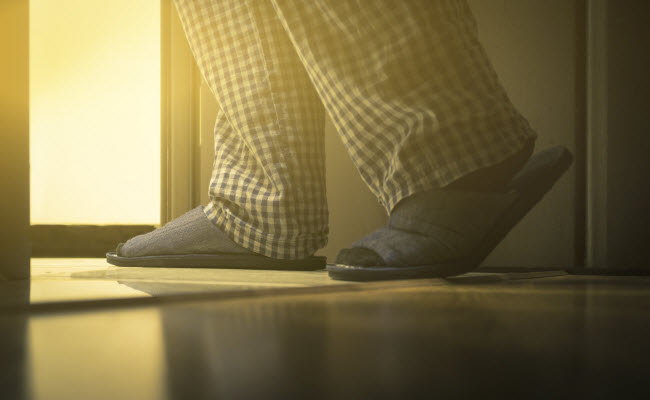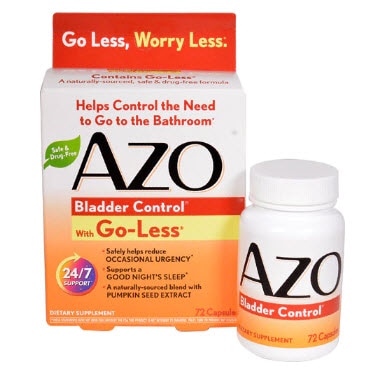Mounting research demonstrates that few things are as important to your health as sleep.
For good cause, too: Sleep is as essential and life-sustaining as breath; a period in which every bodily function is repaired and rejuvenated.
But what happens if you’ve taken this to heart, committed yourself to 7 to 9 hours of rest per night—and are frequently awakened by the urge to urinate?
What is nocturia?
Technically known as nocturia, the condition is defined as the need to urinate one to two times after you’ve hit the sheets. And while its name has an exotic feel, it’s far more common than you might think, impacting two-thirds of people between the ages of 55 and 84. As the National Sleep Foundation reports, symptoms include “excessive urination (need to urinate too much fluid), frequent urination (too many visits to the bathroom for various reasons), urinary urgency (need to urinate sometimes without much result), or reduced urine.” The disruption this causes to one’s sleep is not only aggravating, but, over time, it can lead to a host of health problems, including fatigue, irritability, poor job performance and suppressed immunity (to say nothing of the more critical issues associated with sleep deprivation, such as an increased risk for heart disease, obesity, and diabetes).
Sound all too familiar? Read on to find out why nocturia happens—and how you can manage it.
What causes frequent urination at night?
That glass of wine with Netflix, that green tea you sip throughout the evening, even that bottle of Perrier you drink as you take your nightly vitamins—all can contribute to, if not cause, nocturia.
The Urology Care Foundation notes that nocturia can also be caused by the timing or dose of certain medications (such as diuretic medicine, cardiac glyocides, demeclocycline, lithium, methoxyflurane, and excessive vitamin D) and sleep disorders like insomnia and sleep apnea.
A handful of underlying conditions may also cause or contribute to nocturia, including hypertension, untreated diabetes, heart disease, bladder obstruction, restless leg syndrome, edema in the lower limbs and an enlarged prostate.
Women in menopause may also experience nocturia, as well as menstruating women right before their cycle (lowered estrogen levels may lead to reduced muscular pressure around the urethra, prodding the compulsion to pee). And if you’ve recently had a child, you can experience bouts of nocturia—and not just because your newborn is crying.
How to stop urinating at night
First, tell your doctor—and have a record of your sleep habits and bladder patterns in hand. It’s vital that your physician rule out a possible health condition and/or that your medications aren’t disturbing your natural urinary habits. To this end, your doctor may need to conduct a urinalysis, a blood test, an ultrasound, a cystometry (to measure the pressure within your bladder)—or refer you to a sleep clinic.
If your health is sound, resolving nocturia may be a matter of adopting a few lifestyle changes. Begin by examining what you ingest in the two to four hours before bedtime. As mentioned, caffeine and alcohol both act as diuretics, prompting an increased need to urinate. (Beer, in particular, stimulates urine production.) If you do take diuretics, the Urology Care Foundation recommends taking them at least 6 hours before you crawl under the covers.
Next, consider doing Viparita Karani (or Legs-Up-the-Wall Pose) prior to bedtime. Not only do yogis consider it the magic bullet for a litany of health issues, but “when you elevate your legs, it helps to redistribute fluids back into the bloodstream, reducing the need to urinate,” the Official Foundation of the American Urology Association says. (Compression socks work too.)
Additionally, try taking a nap during the day. Naps will help you feel better after being up and down all night; they also allow liquids to be absorbed in the bloodstream. Just be sure to keep your naps brief, so as to not further disturb your nighttime sleep.
You may also want to think about trying acupuncture for relief: In a study published by the National Institutes of Health, 97 percent of nocturia patients responded “positively” to acupuncture treatment.
Further, ensure you’re maintaining a healthy weight. Excess weight can put pressure on your bladder, thus increasing your chances of waking up in the dead of night to urinate.
Lastly, assess how well you’ve been sleeping, period. For some, the urge to urinate occurs simply because they’re woken up by other disturbances—that iPhone vibrating on the nightstand, a stress-triggered dream, loud neighbors—which compels them to head to the bathroom while they’re at it. “Typically in these cases, it is not the need to void that awakens them,” the Cleveland Clinic says. For a better night’s sleep, unplug your electronics, unwind with a warm bath or some gentle stretches, and—yes—empty your bladder before plumping your pillow.
Extra support for bladder health:







